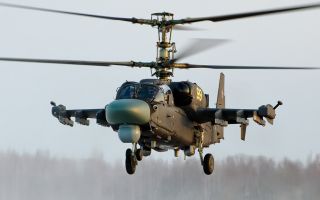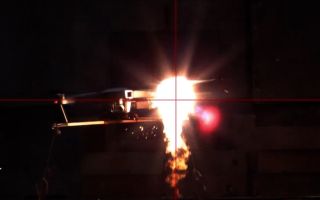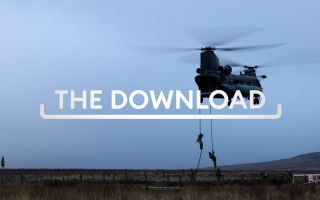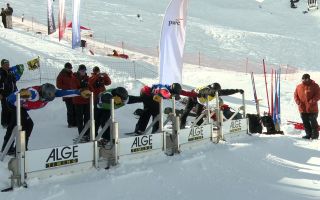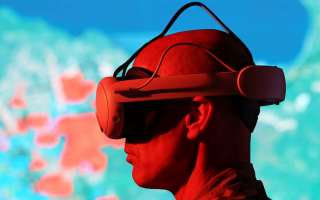Sitrep: Would you press the nuclear button? How wargaming can help prepare for the worst
For centuries, armed forces around the world have tried to prepare themselves for potential conflicts or crises by playing out wargames.
This involves military personnel testing concepts and tactics, and trying to see how their decisions play out in case they are faced with a similar scenario for real.
We spoke to a number of wargaming experts on the latest episode of the Sitrep podcast, which analyses the top defence stories of the week and is available wherever you get your podcasts.
Speaking at DSEI, Rear Admiral Andrew Burton, the UK's director of Joint Warfare at Strategic Command, told us how wargaming is an area UK defence is looking to grow.
"Wargaming is a really varied tool… it can be used in the field, it can be used in head office and everywhere in between," he said.
Rear Admiral Burton explained there are many different tools of wargaming, from table-top games to computer simulations.
"We're expanding defence's capacity to deliver such wargames and really what I want to get after is the culture of war gaming in defence, that it becomes habitual, we're wargaming every day and at all levels," he said.
Anna Nettleship, the managing director of the King’s College London Wargaming Network in the school of Security Studies, told the podcast how wargaming puts decision-makers in positions they may not have been in before.
Ms Nettleship, who served in the US Army for five years, relayed a story where, during a nuclear wargame, the VIP in the room was a nuclear expert who told her there were "no circumstances under which [he] would ever authorise nuclear use of any kind".
"It was an eight-move game and we got six moves in and the rest of us who were not the big decision-makers are arguing our points," she said.
"[We] kicked it over to the VIP and he sort of mulled over everything we said and leaned forward and said 'I think we need to deploy nuclear weapons'.
"And then he looked right at me and I didn't say a word.
"But seeing that happen was a real light bulb moment for me that I don't think he'd ever really… been put in a situation where he felt like he had to make a terrible decision."
Sitrep's Professor Michael Clarke said just because a government or armed force had carried out a wargame of a particular scenario, that didn't mean they would like the outcome.
"That's in a way… what they've got to accept, because the game is all to do with just trying different assumptions, testing different assumptions and changing the parameters and testing them again," he said.
"There were many, many games played during the Cold War within Nato to say 'Well, what would happen if Nato and the Warsaw Pact actually went to war together?'.
"That was gamed out hundreds of times and one of the things that came out again and again was that it was very difficult to make the people playing those games press the nuclear button.
"They did anything to avoid it and even when they had no alternative, they still wouldn't do it and then sometimes the games were then fixed so that you had to press the button to see what would happen next."
Prof Clarke said the Cold War wargaming showed the method does not predict the future, but the games did show how human beings tend to react the same way, even if the parameters have been changed slightly.
"That tells you something about the ways in which reality might then play out if, God forbid, one arrives at those dire moments of history," he said.
Ms Nettleship also explained how human decision-making was key when looking at the process of carrying out conflict - and wargaming is great to test that.
"You can know the exact yield of a certain type of weapon, but that won’t tell you how people react when you use that weapon," she explained.
"That won't tell you how countries and cultures will react to certain things and wargaming is a perfect way to capture decision-making in human behaviour.
"If you can loop in that wealth of data on human decision-making and behaviour, it has incredible benefits for how we fight."
Captain Eugene Morgan, the UK’s assistant head of Defence Wargaming, is in charge of building British wargaming capacity and capability to make better decisions for defence.
He told the podcast: "[Wargames] don't give you an answer, they give you an understanding of the issues and the challenges and the risks."
"I think what it gives you is an understanding of how to evaluate the different situations and scenarios and how to gather the evidence that you might be needing to make the right sort of judgments and provide the right advice and guidance to seniors," he explained.
Just as wargaming has evolved from tabletop games, technology is moving it on even further.
Capt Morgan said he thinks there is "an opportunity to draw from every aspect of technology, of simulation, of modelling, to draw something forward into how future war gaming would look".
"I'm particularly excited about how maybe we can speed up the process of designing and then delivering and analysing wargames," he said.
"That allows technologies such as large language models and AI to have a part to play in developing what might become a really exciting, quick way of taking a problem, understanding the context of that problem, designing a game, producing the actual game itself, executing it, doing the analysis and feeding back."
So how do you convince sceptics they are better off simulating exercises as opposed to playing them out on Salisbury Plain?
Capt Morgan explained it simply, saying: "It saves money and potentially saves lives."
He said wargaming allows military decision-makers to better understand how we are spending our money and being clear about how that money will contribute to military outcomes.
"We can be more efficient in the way that we make the decisions," he said.
"Better evidence, better decisions I think lead to better defence."
You can listen to Sitrep wherever you get your podcasts, including on the Forces News YouTube channel.

